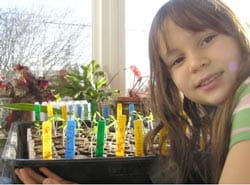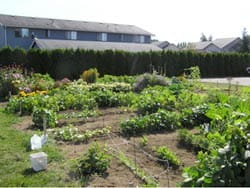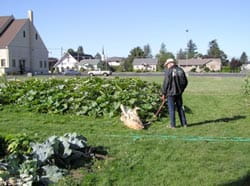By Christine Sine
 One of the surprising responses to the economic recession has been vegetable gardening. Tough economic times have sent people everywhere scurrying for garden books and packets of seed. In 2009, an estimated 9 million Americans started gardens to supplement their diets. Even the White House planted an organic garden to seed the presidential salads. Community gardens are springing up in church parking lots, housing projects, and school playgrounds. And in some urban areas, vacant blocks of land that have stood empty for years are now blooming with life.
One of the surprising responses to the economic recession has been vegetable gardening. Tough economic times have sent people everywhere scurrying for garden books and packets of seed. In 2009, an estimated 9 million Americans started gardens to supplement their diets. Even the White House planted an organic garden to seed the presidential salads. Community gardens are springing up in church parking lots, housing projects, and school playgrounds. And in some urban areas, vacant blocks of land that have stood empty for years are now blooming with life.
 Church congregations have a myriad of good reasons to start a community garden. The most common motivation for faith-based community gardens is the opportunity to help those in need, especially during turbulent times. Others, out of concern for their children, want to provide locally grown organic food and enable their families to develop healthy eating habits. Still others are motivated by the desire to heal our earth or provide a beautiful green space for their congregations and neighbors in which to enjoy God's good creation.
Church congregations have a myriad of good reasons to start a community garden. The most common motivation for faith-based community gardens is the opportunity to help those in need, especially during turbulent times. Others, out of concern for their children, want to provide locally grown organic food and enable their families to develop healthy eating habits. Still others are motivated by the desire to heal our earth or provide a beautiful green space for their congregations and neighbors in which to enjoy God's good creation.
A community garden is not just a place to grow food. It is a way to express our faith and interact with God and God's good creation. Perhaps one reason God created human beings to tend the garden is because God knew that it is in the midst of a garden that we connect most intimately to the character and ways of our Creator. Edythe Neumann, who is helping Highland Community Church in Abbotsford British Columbia to establish a community garden, commented:
The act of gardening can teach us something about ourselves, about our interdependence with the world of nature, about the relationships between work and creativity, and about how we might begin to discern those spiritual facts that elude us in other aspects of life. Gardening can also be an expression of community and conversation -- another way to say that God is with us on the earth, a way to picture God's presence with us -- through the gifts of nature and gardening together.
 The most important step in establishing a church-based community garden is planning. Bring together a small group of passionate individuals who really want to see this happen. Before getting into discussions about garden logistics, talk about why you feel this is important as a church activity. What are the benefits you hope the congregation and the neighborhood will gain? How will it help people connect more intimately to each other and to God? What are the values and characteristics of God's kingdom that this garden could portray?
The most important step in establishing a church-based community garden is planning. Bring together a small group of passionate individuals who really want to see this happen. Before getting into discussions about garden logistics, talk about why you feel this is important as a church activity. What are the benefits you hope the congregation and the neighborhood will gain? How will it help people connect more intimately to each other and to God? What are the values and characteristics of God's kingdom that this garden could portray?
Jeff Littleton, who helped establish Five Loaves Farm, which is developing a network of community gardens on church properties in Lynden, WA, told me:
The garden teaches at least two key messages beyond that of vegetables or ladybugs. One is for our church: to share, to cooperate with, to relax, to enjoy each and everybody whatever faith or worldview. The other is for our community: their capturing that these "church people" can be trusted, they do live out what they say, they love us . . . and ‘I want to know why.' Somehow, some way this joint experience will transform lives and transform communities under God's care."
For me, fostering community and generosity are the most important kingdom values a church-based garden can portray. Working together as a church community provides a wonderful sense of accomplishment and offers tremendous opportunity to strengthen intergenerational ties as young and old work side by side, weeding, watering, and planting. You may even like to designate a special area as a children's garden where children are allowed to choose what grows and when it is harvested. At our small intentional community, the Mustard Seed House, we grow about 50% of our own vegetables. Seven-year-old Catie not only gets a chance to introduce new vegetable varieties each year, she is also my best year-round helper. A few weeks ago she practiced her newly developed writing skills making markers for our tomato seedlings.




